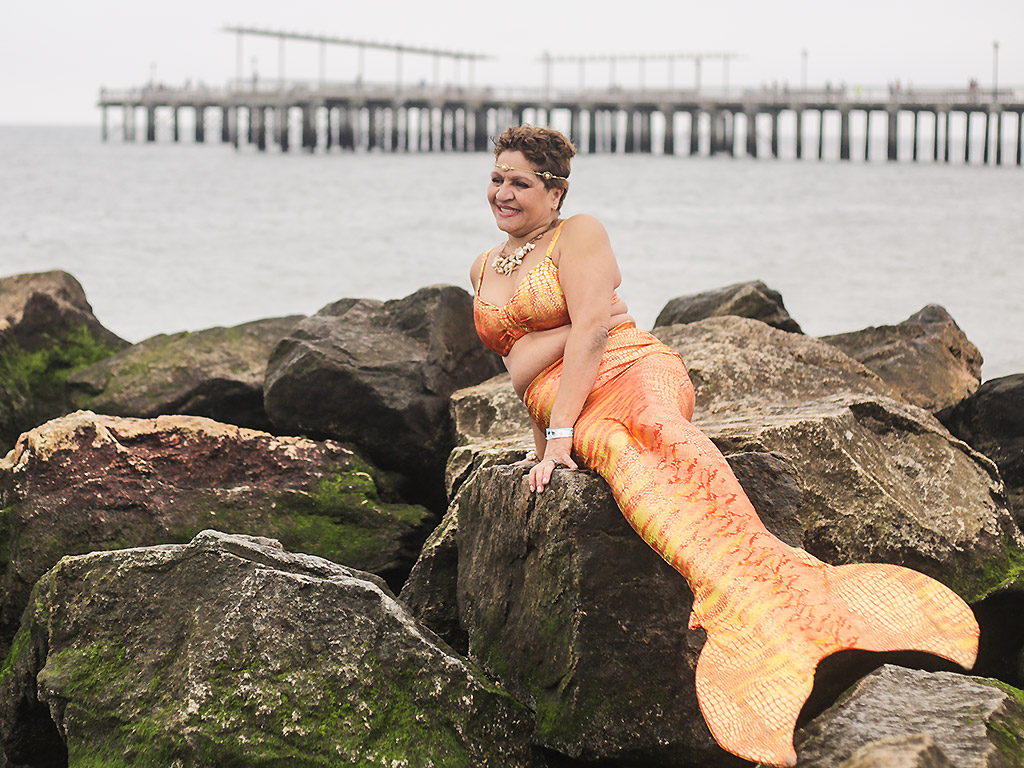Chances are, if you discover that someone dresses up like a mermaid and goes swimming in the ocean, you’ll think they’re “crazy” or have something wrong with them. It’s easy to lump people in mer-culture (yes, it’s its own thing) with other zany-looking subcultures, like furries or any varied type of cosplay, but it’s more than that.

In Ali Weinstein’s documentary, Mermaids, playing at Toronto’s Hot Docs International Documentary Festival, you’ll meet a handful of 21st-century women who identify as living, contemporary versions of the legendary sea creatures. Each of them has their own personal reason for “mermaiding,” including Harlem resident Cookie, who escapes severe agoraphobia through her mermaid alter-ego, and transwoman Julz, who uses her mermaid self to forget her abusive Bible Belt upbringing.
The womens’ stories are heartfelt and real, and rather than using mermaiding as a spectacle, the women discover serenity, peace and a sense of contentment once they put on their tails. Global News sat down with Cookie and Weinstein on the shore of Lake Ontario to talk about the phenomenon. Here are 4 things we learned from them, and from watching Mermaids.
READ MORE: Stephen Colbert says Donald Trump turned the Oval Office into ‘an 8-year-old’s’ dream
Mermaids are more than Ariel and Splash
In modern culture, when people think of mermaids they think of the Disney classic The Little Mermaid (Ariel) or the 1984 movie Splash. Depictions on film or TV are just that: depictions. The mermaids we see on screen while offering inspiration for real-life mermaids in terms of costume or design, aren’t necessarily what people in mer-culture aspire to. For these women, becoming a mermaid is an escape from the stresses and difficulties of everyday life, and a surprising number of them actually feel a compulsion to put on their tails and head to a body of water when things get rough.
For Cookie and others like her, mermaiding is not about cosplay; the two are very different things.
“The makeup and the accessories are great, but aren’t totally necessary, at least to me,” said Cookie. “To me, salt water, seaweed, that’s what mermaids are to me. The younger generation considers it more cosplay. I could be wrong, but that’s how I see it.”
Rather than just fantasy, embodying a mermaid can actually be therapeutic
This isn’t just escapism, either. Becoming a mermaid allows for a sense of completion, a fullness. Years ago, Cookie couldn’t even leave her apartment because of her phobia; but as a mermaid she’s filled with confidence and has no problem going outside and interacting with people.
READ MORE: Jeff Goldblum confirmed to appear in ‘Jurassic World’ sequel
“It’s a form of therapy,” she continued. “My first form of therapy was dancing, but then it became too hard as I got older. But with swimming, it’s helpful with my asthma and my legs. I couldn’t even go to the store before, and now I’m in Canada! Now I have family, and that’s what mermaiding provides for me. It’s a way of life.”
“It’s interesting, a lot of people see it as this bizarre, fantasy thing,” said Weinstein. “There’s definitely a fantastical element, but if we listen to Cookie we can see that it’s actually heightened her sense of reality, and it’s allowed her to see the world.”
In literature and history, mermaids are strong, yet inherently flawed figures
In doing her research for the documentary, Weinstein uncovered hundreds of historical stories about mermaids in folklore from around the world. Rather than the usual depiction of mermaids as these perfect beings, she uncovered their frailty. Despite their beauty and etherealness, there is always a fragility and an inadequacy to them. It seems like mermaids are always wanting something they can’t have: namely, to exist on land and among humans. That foible makes mermaids relatable to people who might feel that way about their own lives.
“Certain people have such a deep connection to the icon or archetype of the mermaid,” said Weinstein. “It’s so ephemeral and difficult to define what that draw is, and I still don’t have a concrete answer to it. As I started researching, I realized how many mermaid myths there are all around the world, from Russia to Japan to the Amazon, even Inuit mythology.”
READ MORE: Sony reportedly ends partnership with Dr. Luke amid legal battle with Kesha
“I find that for most, if not all of these mythologies, the things that remain the same for all of them is that this woman is strong, independent, free and beautiful,” she continued. “At the same time, in a lot of the mythologies, she is lonely and sad. She suffers. There are a lot of stories about unrequited love. It’s this duality that makes her character so relatable to women; she’s aspirational, but because she suffers and has these inequalities, we can identify with her, too.”
There is a huge international mermaids subculture, and it’s growing
Sure, mermaids most likely never existed in reality, but the mermaid subculture is on the rise. There are mermaid conferences, like North Carolina’s Merfest, and countless other gatherings. For whatever reason, more and more women (and some men) are escaping into this underwater world. Weinstein, a former synchronized swimmer who has studied the phenomenon for some time now, and even Cookie, who’s fully a part of it, can’t really explain its allure or why it’s growing. All they know is that they’re now part of a global mer-family.
“It’s not just the trend that’s growing, it’s our family,” said Cookie. “Last year at Mer-Mania, there were 450 mermaids in attendance, but the first one I went to only had 250. It keeps growing. It brings me so much joy.”
“People have been fascinated by mermaids forever,” agreed Weinstein. “They’ve always been in our literature and our culture. Right now, there seems to be this extra amount of mermaids out there. To be honest, I thought the trend would die already, and it just seems to be getting bigger. I find it difficult to explain, but there it is.”





Comments